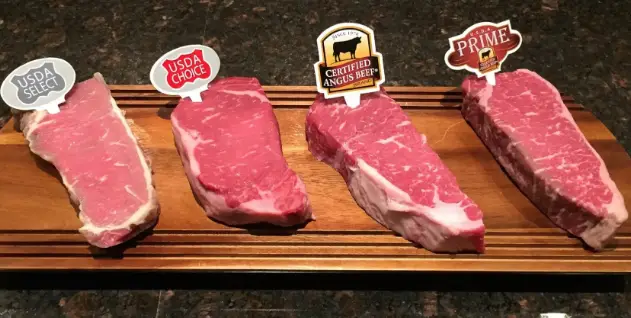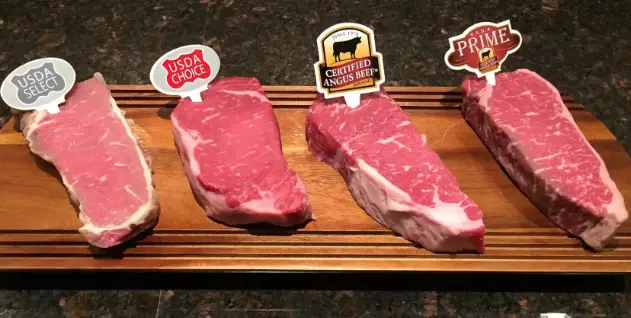
Ask the Experts – Beef Buying Tips
Have you ever gone to the grocery store looking for a perfect steak but you don’t know what to get? Hey, we’ve got some tips for you today on how to get the best one.
In this post we’re going to cover what to look for in a steak, questions to ask your butcher to get the right option and we’re even talking with a meat scientist to uncover some of those common questions like: grass vs grain fed, hormones, and more!
So let’s go to the experts at Certified Angus Beef!
Grades of Beef
There are 3 types of grades of beef: USDA Select, USDA Choice, and USDA Prime. What’s the difference? Marbling. Marbling are the small white flecks within the meat. Don’t get this confused with gristle, because marbling is what creates that great buttery and rich flavor in meat. The more marbling the better the flavor. Select has the least amount, while Prime has the most. Prime will also carry a higher price tag!

Now, let’s move on to the tips we’ve got from our butcher!
Tip #1: Make friends with your butcher.
First of all, don’t be afraid to go ahead and ask some questions. After all, this is the guy or gal to go to when you have meat-related questions.
Here’s are some top questions to ask:
- When was this cut? This will give you ideal freshness.
- Have a recipe in mind – If you have a recipe in mind ask the butcher what would be the best cut to use. That way you save time and money!
- Request a special cut – You can get the custom cut exactly how you like it, including thickness. You can also ask to trim the fat off around the edge if you prefer.
Tip #2: Visit the butcher in the morning.
The most experienced butcher in the store is usually the one that opens up. He or she is the early morning person taking care of loading the case for the day. This is the best person to ask for advice. If you can’t make the store in the morning- call in. That way you can have your order ready to go when you get there.
Dry Age vs Wet Age?
Predominantly, beef in our country is wet aged. Meaning, it’s in a vacuum seal when it comes to your grocery store. However, in restaurants and in some grocery stores they are dry-aging beef. The whole idea is to take it out of that vacuum seal, put it in a controlled environment and put age on it. Dry aged beef has a unique flavor and tastes different across the country because the aging is dependent on environmental factors.
Your Questions Answered by the Meat Scientist

We spoke with Diana Clark of Certified Angus Beef to explain some of those confusing labels when it comes to beef. Don’t forget to check the video below for our full conversation with her and more in-depth information.
#1: Grass Fed vs Grain Fed
All cattle start off grass fed. It’s those last 4-6 months that they are going to be moved to the feed yard where they are finished on a carbohydrate/protein/grain/forage/minerals. So, whether it’s grass-finished or grain-finished, you’re still going to get a balanced diet.
There’s also a different taste in the texture. That’s because you’re going to get more marbling in the grain-finished cattle, so you get more beefy robust flavor vs a grass-finished cattle that are typically a bit leaner and have a gamey flavor.
#2 Antibiotics and Hormones
From an antibiotic stand point, any beef that is treated with them is done for a purpose. It’s usually to make sure that animal is in good health. But they also go through withdraw periods, so in the end, there’s zero residue left in that meat.
Hormones may be used on cattle to help the animal eat that food and grow a bit more productively. It’s roughly 0.6 nanograms of difference. It’s like a grain of sand on a football field. It’s really not doing anything to impact human health whatsoever.
#4 What’s That ‘Natural’ Label?
It really just means that it’s never been processed. So if you take a cut of meat, put in a tray, it’s natural.
But there’s also natural in terms of growing. Some companies have it as a brand and that’s beef that’s never been given antibiotics, hormones and an all vegetarian diet.
